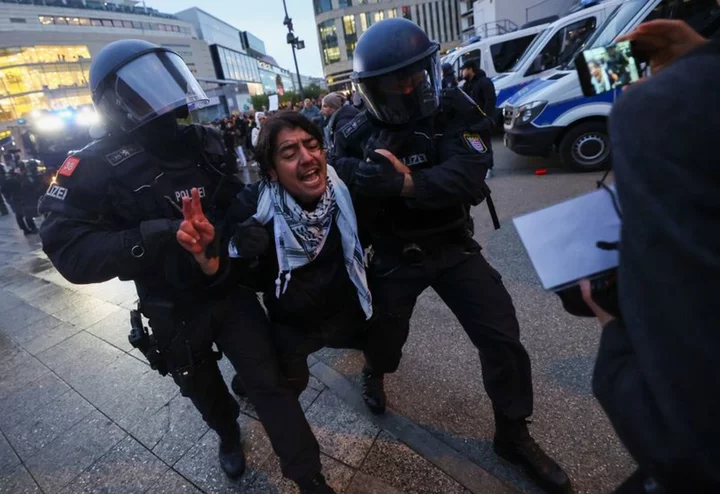By Riham Alkousaa, Thomas Escritt and Layli Foroudi
BERLIN/PARIS As tens of thousands of people took to the streets around the world on Oct. 13 in support of the Palestinians, all such protests in Germany and France were banned.
The two countries - home to the European Union's largest Jewish and Muslim communities - have cracked down on pro-Palestinian groups since Hamas militants burst over the border from Gaza and killed more than 1,400 Israelis on Oct. 7.
The governments say the curbs are to stop public disorder and prevent antisemitism.
But supporters of the Palestinians say they feel blocked from publicly expressing support or concern for people in the Hamas-controlled enclave of Gaza without risking arrest, their jobs or immigration status.
More than 3,500 people have been killed in Gaza since Israel launched a campaign of retaliatory bombing, while a blockade that prevents food, fuel and medicine for getting in has created a humanitarian crisis.
"We are scared, we are worried about being accused of justifying terrorism, when we just want to support a humanitarian cause," said Messika Medjoub a 20-year-old French-Algerian history student.
She was speaking at a banned protest in Paris last Thursday which police broke up with teargas and water cannon.
French Interior Minister Gerald Darmanin clamped a nationwide ban on pro-Palestinian protests last week, citing the risk of public disorder. Nine have been banned in Paris since Oct.7.
Over the weekend, Paris police issued a ban on the "presence and circulation of people that present themselves as pro-Palestinian". Since Oct. 12 they have issued 752 fines and arrested 43 people.
In Germany, Berlin police have approved two requests for pro-Palestine protests since the initial Hamas attacks, a police spokesperson said. Both were proposed as silent vigils.
But at least seven, including one called Jewish Berliners Against Middle Eastern Violence and another entitled Youth Against Racism, were refused permission. At least 190 people have been detained at protests.
The French and German governments say they need to protect Jewish communities given a rise in antisemitic violence since the attacks by Hamas, which is deemed a terrorist group by the EU and several countries.
In Germany, the issue is particularly acute because of the killing of six million European Jews in the Holocaust by the Nazis.
"Our history, our responsibility for the Holocaust makes it our duty in every moment to stand for the existence and security of Israel," Chancellor Olaf Scholz told legislators last week.
Darmanin said on Tuesday that 327 antisemitic acts had taken place in France since Oct. 7, with 183 arrests for antisemitism or apologising for terrorism.
Human rights groups say Jewish communities must be protected but they are are concerned legitimate protest is being repressed.
"Human rights law doesn't allow the government to just broadly say there is a concern about violence and use that as a justification to ban protests," said Benjamin Ward, a deputy director at Human Rights Watch.
"The question is whether it's proportionate - and that's where I think there is a concern."
Hungary and Austria have also blocked pro-Palestine protests since Oct.7, while in the rest of Europe large rallies supporting Palestinians have been held with few restrictions.
HISTORIC RESPONSIBILITY
With an estimated 30,000 Palestinians, Berlin has one of the largest diaspora communities outside the Middle East, and anxiety over what is happening in Gaza is running high.
At an unauthorised protest in Berlin last week, Palestinians who spoke to Reuters said they felt nervous about speaking out, fearful of being labelled pro-Hamas in a country where supporting Israel is sacrosanct.
"I feel that in Germany we're not allowed to speak our mind," said Saleh Said, standing on the fringes of an unauthorised gathering.
A 32-year-old German born to Palestinian parents, he said he condemned Hamas's violence.
Berlin's education authorities last week told schools they could ban students from wearing the Palestinian Kufiya scarf and "free Palestine" stickers.
Post-World War Two German goverments have pursued close ties with Israel because of the Holocaust.
Felix Klein, Germany's ombudsman in charge of fighting antisemitism, said the country's history meant it had to be especially vigilant.
Even before the Hamas attack on Israel, Germany was restricting pro-Palestinian demonstrations, with Berlin authorities banning several on public safety grounds.
Amnesty International said in September that German police's justifications for bans on pro-Palestinian groups appeared to be based on "stigmatizing and discriminatory stereotypes", citing references in police orders to people "from the Arab diaspora, in particular with Palestinian background".
FRANCE CRACKS DOWN
In France pro-Palestinian groups were also facing curbs prior to the attacks.
An attempt last year to ban two organisations - Collectif Palestine Vaincra and Comite Action Palestine - was overruled by a higher court who said their "bold, even virulent" positions did not constitute hate speech or terrorism
Interior Minister Darmanin announced that he had initiated judicial proceedings for "antisemitism, apologia for terrorism and support for Hamas" against 11 organisations, including Collectif Palestine Vaincra and Comite Action Palestine. Both deny the allegations.
On Wednesday, in response to an appeal against Darmanin's instructions, a court said local authorities should ban protests on a case by case basis.
In a memo about one set of protests last week French intelligence services said it would attract "radical elements from the ultra-left, close to Islamist movements and young people from sensitive neighbourhoods".
People who spoke to Reuters at a banned protest in Paris last Thursday said the government's move to prevent gatherings for Palestinians was unfair but unsurprising.
"The government is indulgent when it comes to Israel's crimes. They are being biased and they are showing it," said Hortense La Chance, a 32-year-old cook.
(Reporting by Riham Alkousaa and Thomas Escritt in Berlin and Layli Foroudi in Paris, additional reporting by Kate Holton in London, writing by Thomas Escritt, Editing by Angus MacSwan)

